- Home
- Lisa Smedman
Vor: The Playback War Page 3
Vor: The Playback War Read online
Page 3
But Irina didn’t share these doubts. She hunted Union soldiers with the same amount of zeal that she’d put into hunting poachers. The irony was that the grenades she wielded came from the munitions factories in Monchegorsk that she’d raged against. Factories like the one that had irradiated a vast swath of the nature reserve she worked in, causing her to seek medical assistance, which resulted in her conscription. And yet she didn’t seem to have the same bitterness that Alexi did.
It was enough for Alexi that he was fighting in Vladivostok. Just over a century ago, the port had been a transit point for prisoners and dissidents bound for the Gulag camps of northern Siberia. Shipped east by the Trans-Siberian Railroad in cattle cars, they were loaded into the holds of ships and taken north to the gold mines of Kolyma, the Auschwitz of the original Soviet state. Twenty million died, and their crushed bones were used to build the roads that connected the camps to the mines.
One of Alexi’s ancestors—his great-to-the-power-of-four-grandfather—had been sent to the Gulag in winter aboard a ship on which the political prisoners revolted. The sailors turned the hose on them, and when the ship eventually docked, three thousand corpses were entombed in a block of ice in the hold.
Alexi was also descended from even earlier exiles to Siberia. On Alexi’s mother’s side, his ancestors had been sent to the “land of chains and ice” centuries before the first Soviet Union came to be. But like the political prisoners of a later century, their crimes had been mere excuses to send them east. One of Alexi’s ancestors had been exiled for participating in an illegal prizefighting match, another for fortune-telling. The fortune-teller was rumored to have foretold the death of Peter the Great in 1725 a little too accurately, and was banished as a political conspirator by his successors.
Alexi shook his head. Strange, that he should be defending a land that had treated his forebears—and himself—so poorly.
An explosion rattled the ground, and something splashed into the murky water behind Alexi. He whirled around, certain that someone was watching him—but saw only darkness in the corner of the ruined basement. A ring of ripples spread outward from a spot on the sewage-covered floor where something had landed—probably a fragment of debris thrown up by the explosion.
Alexi tensed. Had something moved?
Alexi squinted, convinced his mind must be playing tricks on him. That corner of the basement seemed darker, somehow. As if a shadow had settled over it. But there was nothing there. . . .
He was getting jumpy. He’d nearly opened fire on a shadow. He needed to sit down, to rest. So what if he sat this battle out? He hadn’t asked to join this squad, he didn’t really care about Vladivostok—and one man wouldn’t make a difference, anyhow.
A chair sat at the center of the basement. Alexi pulled it over to one wall and sat with his back against the cement. Trying to tune out the sounds of the explosions and bursts of rifle and machine-gun fire, and ignoring the static in his helmet speaker, he stared up at the darkening sky. It seemed appropriate, somehow, to be looking up at it from a basement filled with sewage. The sludge around his feet had just thawed; the temperature had finally risen above freezing to a balmy ten degrees Celsius just two days ago. A typical July day in Vladivostok, now that the chill of nuclear autumn had gripped the Earth.
Five years had passed since the Change, and Alexi still hadn’t gotten used to the way the heavens looked. The familiar constellations had disappeared, as if wiped away by a careless sweep of God’s broom. In their place were jumbled points of light that astronomers were still struggling to classify into planets, asteroids, and stars. Shifting wisps of what looked like electrified mist drifted across the sky, causing the points of light to twinkle. These tendrils looked something like the aurora borealis, except that they were a ghostly white instead of electric blue.
As to where the sun had gone, not even the scientists could say. It had vanished on the day of the Change—yet not completely. Dawn, day, dusk, and night followed each other as they always had, as if the sun had merely become invisible. The sky turned its familiar blue during the day and became inky black at night.
Dominating the sky was the Maw, an angry eye of boiling blue-white light twice as large as the sun and spotted with dark gouts of red. It rose in the east and sank in the west each day, appearing halfway through the day and only sinking below the horizon late at night, a reminder that the Earth was still rotating once every twenty-four hours.
After the Change, the scientists had tried to reassure a panicked public that the Earth was in no immediate danger of being sucked into the fiery depths of the Maw—that although it appeared to be closer than the sun had been, it was in fact several light-years away. But their reassurances had been lost in the chaos and upheaval that followed the Change. To appear so large in the sky, the Maw had to be huge beyond imagining. Distant though it might be, to a public unaccustomed to thinking in terms of light-years, its mere size was threat enough.
From somewhere nearby came the sound of a rocket exploding. The noise caused Alexi’s thoughts to drift back down to earth. He wondered if anyone had died in the blast—and where the rocket had been launched from. He glanced around the walls of the basement and decided he was safe enough where he was.
The war had been raging for five years, ever since the Change. Alexi would have thought that, in the wake of the chaos and upheaval that followed the Change, the Neo-Soviets and the Union of North America would have set aside their differences. But instead Alexi’s nation had launched a nuclear attack just minutes after the Earth was transported into the Maelstrom. Perhaps the Neo-Soviet leadership had anticipated the Union would fall as easily as China had. But the Union had fought back, and now World War III was raging both on Earth and on the recently colonized moon.
When he had signed up for military service, Alexi had set his heart on the stars and the mystery of space. He thought that by joining the military, rather than waiting for the Neo-Soviet bureaucracy finally to grind its way around to conscripting him, he could choose the arm of service he wanted. He’d honestly believed that his education—and the fact that he had served the state well as a schoolteacher, instilling a proper appreciation of the history of the original Soviet Union—would merit him a ticket into the space arm of the military. He yearned to probe the mysteries of how and why the Earth became trapped in the Maelstrom. At the very least, he hoped to get off this poisoned planet.
Instead he was assigned to a military unit that would never leave the Neo-Soviet Union, let alone Earth. His education and teaching experience had merited him only a minor rank within one of the infamous rad squads—radiation-poisoned conscripts who were used as missile fodder in situations where trained soldiers could not be spared. He’d been condemned by his eyesight. But at least he didn’t have to take antiradiation pills, like the rest of the squad.
Alexi heard a second explosion—also a rocket, by the sound of it. After so much time in battle, he could tell the sounds apart, just as Vanya could identify musical notes that were right next to each other on the scale. Alexi wondered whose death the explosion heralded.
Something overhead caught Alexi’s eye then. A shooting star? No—more than that. The streak of light in the sky was increasing, growing.
Alexi stood. The chair splashed over sideways into the muck.
The Maw blazed brightly in the sky, a disturbing glare of white-blue light. Between it and the moon, a bright star blazed in the sky. A feathery streak of reddish yellow light trailed behind it. A meteor, then, burning up during its entry into the Earth’s atmosphere. Or perhaps a piece of space debris—one of the satellites that had gone silent in the seconds after the Change, its orbit degraded until it fell back to Earth.
Over the nearer sounds of battle, a faint whistling reached Alexi’s ears. Whatever was falling from the heavens, it was big.
Slinging his AK-51 over his shoulder, Alexi climbed out of the basement and began ascending the fire escape. Metal scraped against metal as the staircase s
lipped to a steeper angle, then held. Alexi ignored it, climbing ever higher and seeking a better view. At last, when he was level with what had been the third story, he could see over Vladivostok’s hills.
The meteorite streaked toward the horizon. Far to the northwest, Alexi saw a flare of light as it struck the Earth. It had landed somewhere in northern Siberia, up near the Arctic Circle.
Longitude 100 degrees east . . .
Where had that thought come from?
Staring at the horizon like a man trying to remember the location of an important object he had misplaced, Alexi neither saw nor heard the assault suit that clanked toward the base of the twisted girders. Gyros softly whirred as a machine gun trained on the spot where Alexi—obviously an enemy sniper or spotter—stood with a rifle slung across his back.
It was only when the machine gun opened up with a roar and bullets began spanging off the metal girders beside him that Alexi jerked into furious motion. Scrambling to unlimber his AK-51, he tried to bring its barrel down to point at the bright green metal monstrosity below. But his rifle strap caught on a protruding bit of metal.
He was trying to tug his weapon free when the bullets finally found him, punching into his chest like a swarm of exploding bees. His boots slipped on his own blood . . .
and he fell, hallucinating that he was finally floating up into space, toward the streak of light . . .
down toward the heavy-assault suit, whose machine gun chewed his torso into two pieces before it hit the ground.
4
A lexi stared at the rad grenade he’d picked out of the sewage. It was a Neo-Soviet weapon; the Union forces, not wanting to risk irradiating their own soldiers, didn’t use anything so crude. Irina must have dropped it; she was the only one the leitenant trusted with rad grenades.
Normally, Alexi wouldn’t have picked it up. The Neo-Soviet munitions factories were noted for their abysmal quality control; the grenade was almost certainly leaking radiation. But Alexi smiled as he hefted it in his hand. A rad grenade was the one weapon that was guaranteed to penetrate Leitenant Soldatenkof’s armor. . . .
Alexi laughed grimly. If he did muster up the guts to throw a grenade at the leitenant, his satisfaction would be short-lived. He’d only be ensuring his own death by firing squad. And although he’d started off the day with the decision just to let himself be killed and end it all, now Alexi wasn’t so sure that was what he wanted.
Alexi suddenly felt a strange compulsion to look up. He did—and saw a streak of reddish yellow light between the moon and the Maw. A shooting star.
The sight sent a shiver down his spine, driving from his mind the fantasies of killing the leitenant. Instead he felt strangely drawn to the meteor. He wanted to get closer to it, to climb the fire escape that had somehow survived the destruction of the building and get a better look at the falling star. But when he clambered up out of the ruined basement and placed a hand on one of the ladder’s rungs, he shivered with a chill that came from somewhere other than the cold metal under his hand. Alexi was not ordinarily a superstitious man, but it felt as though someone were walking over his grave. He pulled out the gold cross that hung around his neck and kissed it for luck, then tucked it back inside his armored vest.
In one of the incredible periods of silence that sometimes settle over a battlefield, Alexi heard the sound of heavy, thudding footsteps, perhaps a block or two away. It was completely irrational, but he was suddenly certain that the grim reaper herself was walking toward him.
Herself?
Alexi suddenly remembered the rad grenade that he still held in his hand. It would take out the assault suit.
What the hell. If he was going to die today, he might as well die a hero.
Alexi ran toward the sound. As he drew nearer, the noise clarified into the individual sounds of gyro stabilizers and the faint creak of moving metal parts. It was the unmistakable signature of the heavy-assault suit—a turtle shell of rocket-studded steel that turned an ordinary soldier into a walking tank. The Neo-Soviets had focused their weapons development on mutants and chemicals, and were still racing to come out with their own version of the heavy-assault suit. The Union had beaten them in the race and were now proving the worth of this new weapon in Vladivostok.
Over his helmet speaker, Alexi heard the leitenant screaming at Vanya.
“Vanya!” he shouted into his microphone. “Don’t run! It’s Alexi—I’m coming to help you.”
Why had he said that? Alexi didn’t know. It had been pure impulse, illogical. But he had a vivid picture in his mind of Vanya turning and running, and the leitenant shooting him in the . . .
The image was gone. Now the leitenant started directing his curses at Alexi instead, ordering him to maintain radio silence so that his orders could be heard.
Alexi rounded the back of the building that Boris was hunkered down in just as a rocket tore open the corner of one of its walls in a loud explosion. He couldn’t say why, but he knew that the assault-suited enemy’s next shot wouldn’t miss. If he didn’t move quickly, Boris was a dead man.
“Boris!” he yelled into his microphone, praying that it was working. His headphones were cutting in and out in bursts of static; for all he knew, his microphone was glitching, too. “Draw the assault suit’s attention, Boris. A second or two is all I need!”
Alexi emerged onto the street behind the heavy-assault suit, which was painted a bright green. As Boris leaned out a hole in the building above, electric engines whirred and the Union soldier brought the rocket launcher on its shoulder to bear. At this range, it couldn’t miss.
Boris’s voice crackled in his headphones: “Five thousand rubles says I don’t make it out of here alive, Alexi.”
Alexi laughed. Bullets might bounce off the assault suit; metal fragments might fail to pierce its steel hide—but the deadly gamma radiation of a rad grenade would penetrate its armor plating like a laser burning through tissue.
With the fierce energy of a madman—or a hero, which was perhaps the same thing, really—Alexi gave the end of the rad grenade he’d picked up in the basement a vicious twist, priming it. Then he hurled it at the armor-suited figure. It clanked against the monster’s metal back and fell to the street at its feet as Boris ducked back inside the building. Alexi, well out of the tightly focused blast radius of the grenade, simply stood and watched.
The grenade did not go off.
Conscious of the new threat, the heavy-assault suit turned. It stood a meter or two away from the lip of the crater where the crippled assault suit still lay. The glow of a rad grenade—one that hadn’t been a dud—filled the crater, backlighting the scene in a dull orange glow. The machine gun on the green assault suit rotated toward Alexi . . .
“Irina!” he screamed. “Your other grenade—throw it!”
The grenade was already in the air; Alexi simply hadn’t seen it. Or maybe he had seen it out of the corner of his eye—which was his explanation, later, of how he somehow knew that Irina was hiding behind that particular jumble of broken concrete, and that she still had a grenade to throw, even when he hadn’t been anywhere near her.
Irina’s grenade went off.
A cloud of luridly glowing orange blossomed around the assault-suited soldier. The explosion triggered the grenade that was lying at its feet, and the glow brightened. To Alexi, it was as beautiful as a sunrise—something he hadn’t seen in five long years.
The assault suit teetered as the soldier inside it attempted to hurl it into motion. It pirouetted on one foot—then crashed over onto its side in the street. A hatch in the back of the thing opened, and the Union soldier inside wriggled out. The soldier wore a silvery, form-fitting body suit that covered her from neck to toe, hiding none of her graceful curves and lean, toned body. Her face had Asian features: almond eyes and a snub nose. It was a delicate, beautiful face, with intelligent eyes: a face that belonged on a soldier’s tattered snapshot of a sweetheart back home. But instead of a photo-perfect smile, her face held a loo
k of terror. Her mouth was wrenched open in a silent scream, her body bent nearly double as spasms gripped her. Radiation burns were already blossoming like poisonous roses on her cheeks as she lay writhing on the broken concrete.
The leitenant’s voice sputtered out of the speaker in Alexi’s helmet.
That was a good . . . Irina . . . see that . . . commendation for . . . act of heroism.
It didn’t surprise Alexi that Irina would get all of the credit for their joint kill. What did surprise him was the depth of his emotion that the Union soldier’s death had triggered in him. He lifted his glasses to brush away a tear that had welled in his eye. What the hell was this? He hadn’t cried in three long years—not for any of the comrades killed in battle. He’d seen them blown apart, stitched with bullets, burned, crushed . . . He hadn’t even cried when his own sister was reported missing in action after the disaster that was the Battle of Petrograd. Yet when he drew breath as he stared at this woman—this enemy soldier—it stuttered in his throat. His chest ached and he trembled, as if he’d just lost a dear tovarish.
And the greatest absurdity of all was that he felt an urge to go to the woman, to hold her in his arms.
Just like the time . . .

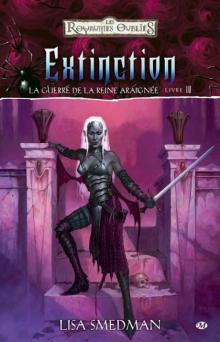 Extinction
Extinction Storm of the Dead
Storm of the Dead Blood Sport
Blood Sport The Lucifer desk (s-2)
The Lucifer desk (s-2) Vanity's Brood
Vanity's Brood Sacrifice of the Widow
Sacrifice of the Widow Vanity's brood hos-3
Vanity's brood hos-3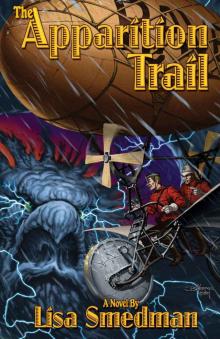 Apparition Trail, The
Apparition Trail, The Venom's Taste
Venom's Taste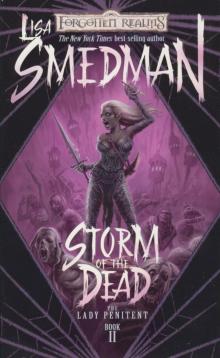 Forgotten Realms - The Lady Penitent - Storm of the Dead
Forgotten Realms - The Lady Penitent - Storm of the Dead Viper's kiss hos-2
Viper's kiss hos-2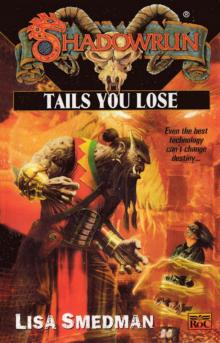 Tails You Lose
Tails You Lose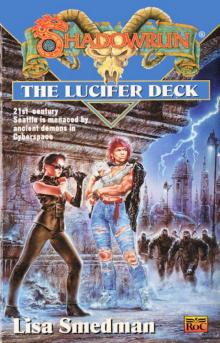 The Lucifer Deck
The Lucifer Deck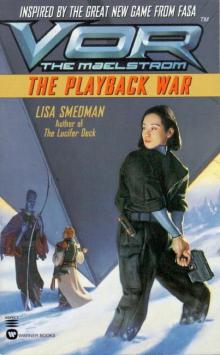 Vor: The Playback War
Vor: The Playback War Forgotten Realms - House of Serpents 1 - Venom's Taste
Forgotten Realms - House of Serpents 1 - Venom's Taste Storm of the Dead зкp-2
Storm of the Dead зкp-2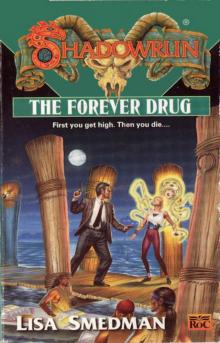 The Forever Drug
The Forever Drug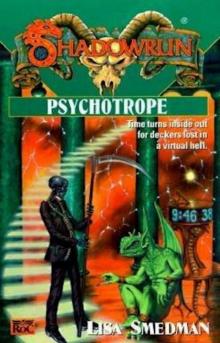 Psychotrope
Psychotrope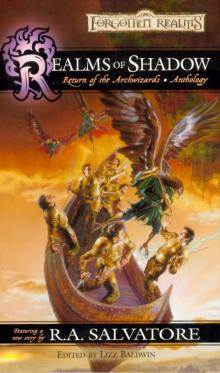 Realms of Shadow a-8
Realms of Shadow a-8 Venom’s Taste hos-1
Venom’s Taste hos-1 Psychotrope s-33
Psychotrope s-33 Ascendency of the Last
Ascendency of the Last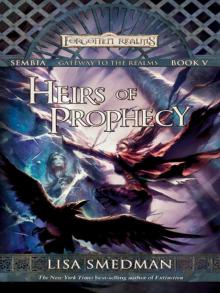 Heirs of Prophecy
Heirs of Prophecy Ascendancy of the Last зкp-3
Ascendancy of the Last зкp-3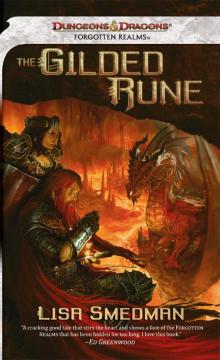 The Gilded Rune (forgotten realms)
The Gilded Rune (forgotten realms) Sacrifice of the Widow: Lady Penitent, Book I
Sacrifice of the Widow: Lady Penitent, Book I The Lucifer desk s-23
The Lucifer desk s-23 Sacrifice of the Widow lp-1
Sacrifice of the Widow lp-1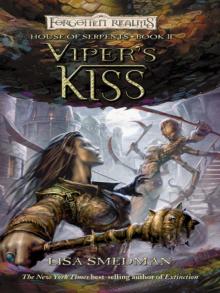 Viper's Kiss
Viper's Kiss Forgotten Realms - The Lady Penitent - Ascendancy of the Last
Forgotten Realms - The Lady Penitent - Ascendancy of the Last